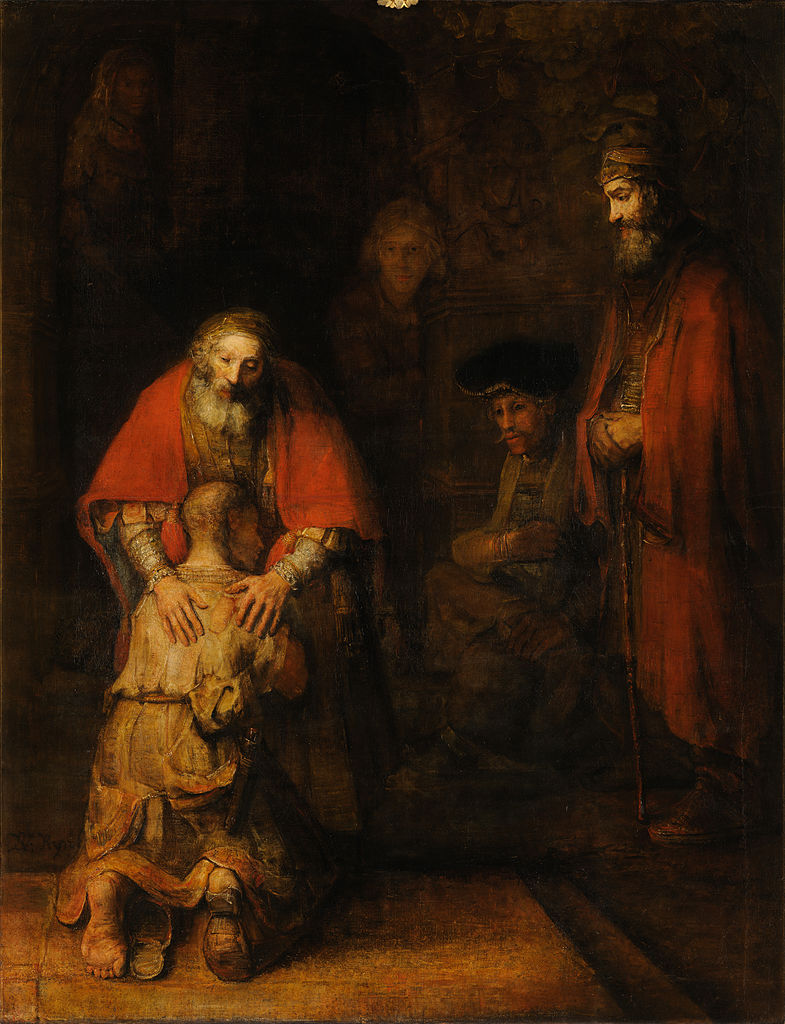XXIV SUNDAY IN ORDINARY TIME - Luke 15:1-32
Apostasy - the great sin of the people
In this Sunday’s first reading, we are presented with the sin of the people - apostasy. In the desert, after experiencing God’s merciful love, which set them free, liberating them from slavery, the people abandoned God and betrayed him, the living God; they were ready to substitute him for an image made with their own hands. With their action, they provoked God, causing his jealousy and anger to arise. In his anger, God told Moses: “I can see how headstrong these people are! Leave me, now, my wrath shall blaze out against them and devour them.” (Ex 32:9).
Yahweh, the God of Israel, is a jealous God, who will not accept anything or anybody taking his place. Only he is God, and there is no other. If we try to play god, we will discover soon the result of our own folly. Moses had to plead with God and intercede for the people, until God relented. We are not different from the people of Israel; we may be even worse, setting ourselves as gods in the place of God. And we are in need of intercessors, like Moses. This passage teaches us that God cannot be taken for granted; we cannot behave as if he does not matter or as if he will allow everything to pass and turn a blind eye on everything we do. We should never provoke God.
The thirteen attributes of God
However, we should remember that we have an intercessor far bigger and greater than Moses, Jesus Christ who is our intercessor, and he shed his blood for us.
Many times, in the Old Testament, we may remain with the feeling that God is a fierce god, always ready to punish, as if his retribution was not different from revenge. But it is not so. In fact, time and again, we discover that God is a patient God, always ready to wait for our conversion. After the people’s apostasy, God revealed himself to Moses as the merciful God:
“The Lord, the Lord,
a God merciful and gracious,
slow to anger,
and abounding in steadfast love and faithfulness,
keeping steadfast love for the thousandth generation,
forgiving iniquity and transgression and sin,
yet by no means clearing the guilty,
but visiting the iniquity of the parents
upon the children
and the children’s children,
to the third and the fourth generation.” (Ex 34:6-7)
According to Judaic religion, this text presents the thirteen attributes of God
1 יְהוָה Adonai — compassion before a person sins;
2 יְהוָה Adonai — compassion after a person has sinned;
3 אֵל El — mighty in compassion to give all creatures according to their need;
4 רַחוּם Rachum — merciful, that humankind may not be distressed;
5 וְחַנּוּן VeChanun — and gracious if humankind is already in distress;
6 אֶרֶךְ אַפַּיִם Erech appayim — slow to anger;
7 וְרַב-חֶסֶד VeRav chesed — and plenteous in kindness;
8 וֶאֱמֶת VeEmet — and truth;
9 נֹצֵר חֶסֶד לָאֲלָפִים Notzer chesed laalafim — keeping kindness unto thousands;
10 נֹשֵׂא עָוֹן Noseh avon — forgiving iniquity;
11 וָפֶשַׁע VaFeshah — and transgression;
12 וְחַטָּאָה VeChata'ah — and sin;
13 וְנַקֵּה VeNakeh — and pardoning.
Jesus is God with us in his merciful love and he never got tired of revealing God’s mercy. He is always waiting for us and always ready to welcome us with open arms.
The parable of the merciful Father
In this Sunday’s gospel, we are presented with one of the jewels of the New Testament: the parable of the merciful father, also know as the parable of the prodigal son. Many times, we reflect mainly upon the son who demanded his share and abandoned his father’s house, in order to lead his own life. Other times, we may reflect upon the older son, a man hard with himself and with the others, who tried to judge everybody else by the standards that he set for himself. He had a very high idea of himself, presenting himself as the righteous one, while all the others were not worthy of spending time with them; in his self-righteousness, he was bold enough to accuse his father and to find him unjust.
However, if we hear the parable attentively, we can notice immediately that the father comes forward as the first and most important figure of the parable. He was ignored, abandoned, accused and despised by his children, even though he had done nothing to deserve that. He did not impose himself on them; he allowed them freedom to choose their own way. When the youngest son run away, he remained hoping against all hope that one day he would come back. He did not get tired of waiting for his child, and when he spotted him still far away, he run to embrace him. In his joy, he did not care about all the explanations and excuses that the son had prepared to present. Without delay, he asked new clothes for his son and ordered a big feast to celebrate his coming back.
This father of the parable is the Father, full of mercy and compassion - the Lord of mercy, as he presented himself to Moses. Indeed, “God so loved the world that he gave his only Son, so that everyone who believes in him may not perish but may have eternal life.” (Jn 3:16).
There are people, like the eldest son, who cannot accept God’s mercy and who may accuse God of being unfair and unjust, as if he has deprived them of something, forgetting that God’s abundance can never be exhausted. God will always be able to satisfy and fulfil all our needs. We do not need to be jealous and envious of others. Instead, all of us should participate in the feast and rejoice in God’s merciful love.

No comments:
Post a Comment